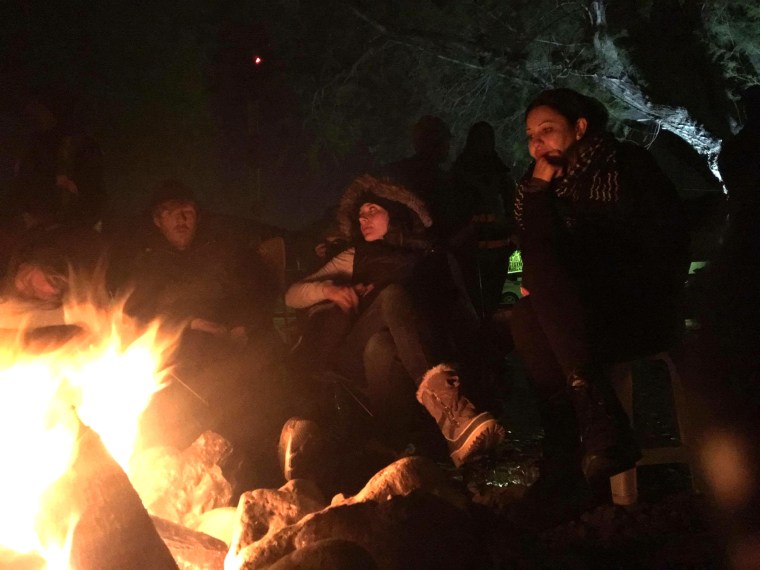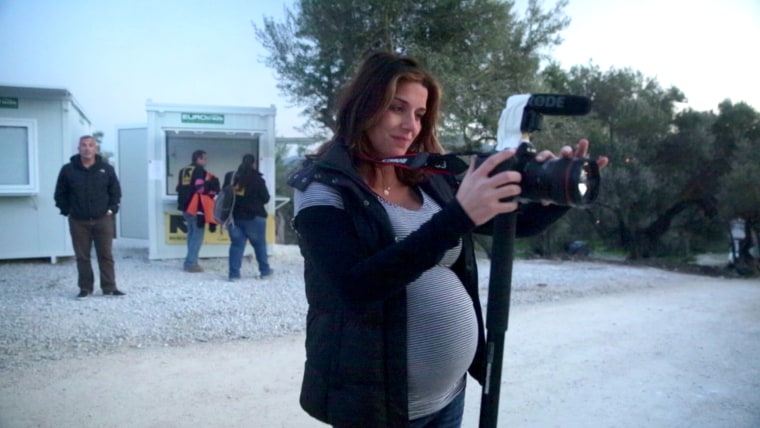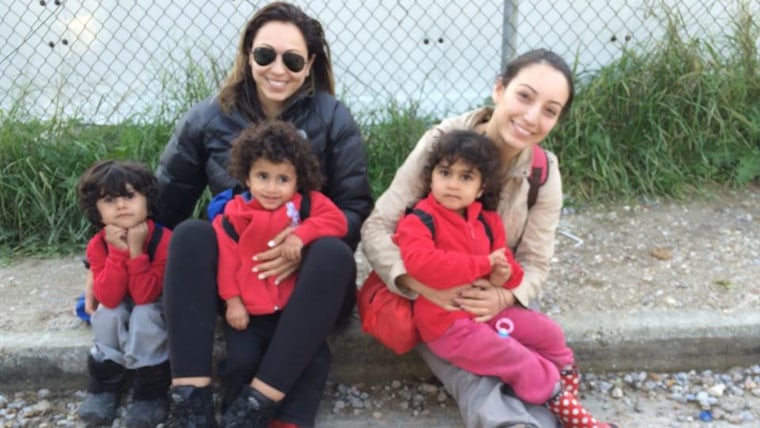It was roughly 2 in the morning, and I sat around a bonfire with volunteers from all over the world, bundled up in about five layers (most of which couldn’t button over my giant pregnant belly). We stared out at the pitch black sea, nervously scanning the water for signs of life. It was so cold… I wondered, how are there babies out on the water right now?
The waves were making loud crashes on the Lesvos shoreline and one of the experienced volunteers muttered under his breath, “This is not a good sign.” I learned that if the waves were bad at the shoreline, they would be up to ten times worse in the middle of the sea. I imagined dinghies full of kids and families hoping they wouldn't die that night. The leader of the search and rescue crew told us to look for faint white lights of the boats filled with refugees signaling for help. But we couldn’t actively signal back, because then we could be accused of illegally aiding entry into the country. So the bonfire’s purpose was not just warmth.

This was my second trip in four months travelling to Greece, filming inspirational mothers trying to make a difference in this refugee crisis. On that night, I and several of the moms I was travelling with ended up perched on a cold cliff, keeping watch with a group of young, brave Spanish volunteers who were ready to plunge into the dark water to save drowning refugees from almost certain death.
That night, I silently looked down at my belly and had a chat with my unborn baby. It went like this: Please let's just keep this all together...tonight would NOT be a great night to make an early arrival!
Full coverage: American moms helping refugee children

Let me back up a bit. Before last fall, words like Syria, refugees and migrants were words that I came across simply because I work at NBC. I didn’t think they’d ever enter into my life. Sure, I would look up from my desk during the day and see the occasional MSNBC headline about the war in Syria or I would see a story in my newsfeed about another boat full of migrants capsizing but I never really paid much attention to it. I just assumed these were boats full of young adult males looking for better economic opportunities. But then I saw THAT photo... little Aylan Kurdi.
I started to pay attention. The photo haunted me. He looked just like my son, Jenson, when he was sleeping at night. Little tush in the air, arms tucked around his little body and all snuggled up in his crib. Except the little boy I was staring at was not asleep. I found myself seeking out information on what was going on across the world. It was then I realized I should have been paying attention a lot sooner than I had.
Read more: How you can help refugee children
You know when you learn a new word and then it seems like you come across that word everywhere? That’s what happened to me with the refugee crisis. As soon as I started paying attention, I couldn’t get away from it. On my Facebook feed, a friend posted a fund-raising link to a campaign collecting baby carriers for refugees, started by a mom like me who'd seen Aylan's photo and was moved to help. I didn’t even think of this as a story at first. But I would check her campaign, hoping she would make it to her $3,000 goal. A week later she was almost at $10,000… that's when the TV producer side of my brain kicked in.
Two weeks and one very passionate pitch meeting with my boss later, I and my co-worker Jen boarded a plane to Athens to film this mom and her small team passing out baby carriers to refugees. They called themselves Carry The Future. The two of us flew to Greece with our cameras, the address of an Air BnB and little expectation of how the week would unfold. Nothing went to plan, but the last day of our trip, we met thousands of refugee families at the Athens port. And these people were nothing as I imagined them to be. They were just like me. These “migrants” were for the most part young parents with their young children who could have easily blended in my kid-infested Brooklyn neighborhood! When we got back to America, I couldn’t stop thinking about the families and the kids I met and wondering what had become of them.
Coming back to “normal life” was harder than I imagined. I would look at a mom on my street carrying her baby in a sling and remember one of the Carry The Future moms gingerly taking a two-week-baby from a weary new mother in Athens and wrapping her infant in a sling. I’d pass the park and see kids playing and hear their joyful screams, and think of all the tired, sad, scared and silent kids I saw at the port. When I went to buy diapers or milk or take my son to school or to the park, the unfairness stung. I had hit the jackpot simply by being born in America; my biggest worry of the month was getting my son in the “best 2s program” and not literally running for my life. I felt like a different person and I wanted to get back to Greece.
Jen and I got our next chance a few months later. A small group of moms decided to distribute aid backpacks to children, and called themselves Operation Refugee Child. Most of them worked full-time outside the home and all had multiple young kids. Yet in a few short months they had raised a substantial amount of money and secured donations from companies like Patagonia, Nike, Honest Baby and American Express. I couldn’t believe how much five busy moms could accomplish in so little time. They were also hysterical, to boot.
Read more: Meet the moms trying to help the littlest refugees
Since this was our second Greece trip, I figured I knew what to expect. The difference was that we were going to Lesvos, the island nearest Turkey where most of the refugees come ashore. Oh, and this time I was about seven months pregnant.
My doctor approved the trip, and I didn't think much about it because I felt great. But what I didn’t anticipate was the incredible fascination EVERYONE in Greece had with my giant belly. The moment I arrived at the Athens airport, I had about three different male airport agents shout at me that I was carrying a boy. “A beautiful son!!” I haven't found out whether I'm having a boy or a girl, but according to the people of Greece, it’s a “strong, handsome, intelligent son.” We shall see. To Jen's annoyance as soon as my belly was spotted, I was shuttled to the front of every. Single. Line. I would just beam back at her and wave. (Sorry Jen!)
Being a pregnant woman in Greece definitely has its perks, I learned. But the ease of the trip ended in that airport.
A lot had changed in four months, and the pressure on Greece from the EU to stem the flow of refugees had created a desperate environment. Refugees were now arriving overnight (when conditions are far more dangerous), and it was one of the coldest winters on record so people (mostly kids) were dying from hypothermia. Most of the refugees were women and children. Because the men were either missing… or dead.When I arrived in Lesvos, I worried I wouldn’t be able to handle seeing kids in danger, even while I was hiding behind a camera, which is a natural barrier. On a normal (non-pregnant) day, I operate at about a 9.5 on a 10-point emotion scale. So throw in pregnancy hormones and some wet, sad kids and I figured, “I am a goner.”
More information: Look inside the Operation Refugee Child backpacks
But it didn’t go down like that. Because the entire week I was around people who exemplified the best of humanity. Somer, Anna and Valentina, the moms with Operation Refugee Child, were a vision to watch with their giant van full of thousands of pounds of aid. The joy they brought the kids and the weary parents was palpable. They are so damn funny too. I laughed more that week than I had in ages despite the situation.
Nothing went to plan. There were no more automatic cars on the island so I ended up being the de-facto chauffeur as I was the only mom who could drive manual. Mind you, I haven’t driven manual in about a decade, the car was loaded with thousands of pounds of aid and we had to drive on rickety island cliff roads with no barriers and lots of massive bumps. So yeah, you try that without peeing a little in your pants at 7 months pregnant. There were a few moments on the road when I thought to myself, “Oh...this baby is coming and I’m going to have to name it Nikko or Aphrodite.”

Working around all the incredible volunteer teams (most who’ve been there since last year) was beyond humbling. I just wanted to hug everyone and thank them. The volunteers and workers greeted the people as they came off the boats and treated them with such dignity and respect, showing them that yes, “Your life matters. YOU exist and we see you.”
Related video: One refugee mother risks everything to give her children a better future
Meanwhile, the refugee mothers we met were more concerned that I sit down than they were thinking about themselves. Somer spoke Arabic to the children and you could see the relief and joy she brought to their little faces. She asked the tired parents, “How are YOU feeling?” and the tears would flow. It dawned on me that it had probably been ages since anyone has asked these parents how they were doing. They were constantly in survival mode for their children. The kids were obsessed with our cameras and did their best to show off their English to us.
Related story: Refugees share their hopes and dreams
To witness all the hearts being opened while these volunteers helped the most innocent of this crisis was a privilege. Maybe we can’t really change the world, or fix the refugee crisis, but these ladies taught me that we can choose to make the world a better place for future generations.
Oh, and another thing I learned? Yeah, mothers really do rule the world.